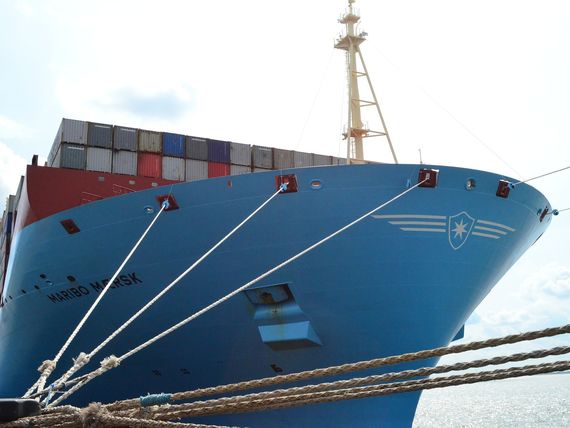Maersk unveils ambitions to be operating a zero-emission fleet by 2050

December 5, 2018 - Maersk Line today announced it has drawn up plans for its shipping fleet and related logistics operations to emit no CO2 by 2050.
However, it warned the industry, if it is to achieve this goal, shipbuilders and naval architects must have developed carbon-neutral ships by 2030 at the latest, and added that “an acceleration in new innovations and adaption of new technology is required”.
Maersk argued that efficiency improvements to current fossil fuel-based technology “can only keep shipping emissions at current levels, but not reduce them significantly or eliminate them”, especially given that world trade is expected to continue growing, and shipping volumes with it.
“The only possible way to achieve the so-much-needed decarbonization in our industry is by fully transforming to new carbon-neutral fuels and supply chains,” said Søren Toft, chief operating officer at AP Møller-Maersk.
The company explained that shipping faced vastly different challenges in developing electric vessels to other modes of transport.
“The yet-to-come electric truck is expected to be able to carry a maximum of two teu and is projected to run 800km per charging. In comparison, a container vessel carrying thousands of teu, sailing from Panama to Rotterdam, makes around 8,800km. With short battery durability and no charging points along the route, innovative developments are imperative,” it said.
And with a ship life of 20-25 years, it said these innovations would need to be developed within the next decades if its fleet is to be carbon-neutral by 2050.
“The next five to ten years are going to be crucial,” said Mr Toft. “We will invest significant resources for innovation and fleet technology to improve the technical and financial viability of decarbonized solutions.
“Over the last four years, we have invested around $1bn and engaged 50+ engineers each year in developing and deploying energy efficient solutions. Going forward we cannot do this alone.”
Maersk said next year it planned “to initiate open and collaborative dialogue with all possible parties to tackle together one of the most important issues in the world, the climate change”. This would include “researchers, technology developers, investors, cargo owners and legislators”, it added.
Since 2007, it claims to have reduced the CO2 emissions of its fleet by 46%. According to environmental group Climate Action, Maersk is one of the top 100 emitting companies in the world, while the shipping industry overall accounts for 3% of global greenhouse gas emissions.
John Maggs, senior policy advisor at Seas at Risk, said: “Maersk is right that emissions have to go to zero before 2050, if we are to avoid climate catastrophe, and they should be applauded for promoting this long-term objective. But that doesn’t absolve them of responsibility for reducing emissions in the short-term.
“In addition to this long-term vision, they need to stop blocking efforts to cap and reduce ship speeds, the only short-term measure that can produce the deep, fast cuts in emissions that are necessary to keep warming below 1.5 degrees.”
Jens Mattias Clausen, of Greenpeace Denmark, added: “This is a big step from the world’s largest shipping company and comes after the IPCC warned us we’ve got just 12 years left to save the climate. So what Maersk does now to follow through on that commitment is critical, because we have no time to waste.”
Source: The Loadstar


